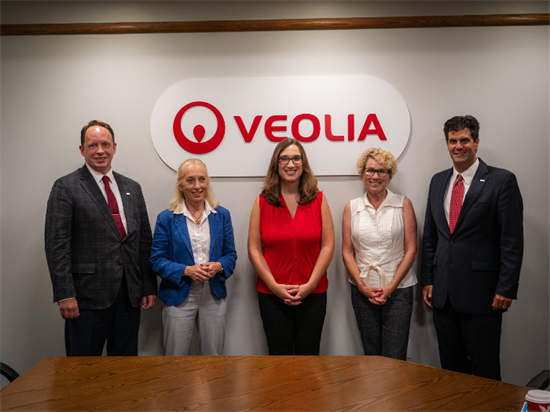Reps. Houlahan, McBride, and Scanlon Tour PFAS Filtration Plant in Wilmington, Highlight Need for Safe Drinking Water and Strong Federal Standards
Wilmington, DE,
August 4, 2025
|
Errin Cecil-Smith (Houlahan), Brandi Brands (Scanlon), Michaela Kurinsky-Malos (McBride)
Tags:
Energy & Environment
July 31, 2025 (Wilmington, DE) — On July 31, Representatives Chrissy Houlahan (PA-06), Sarah McBride (DE-AL), and Mary Gay Scanlon (PA-05) visited the Stanton Water Treatment Plant in Wilmington, Delaware. They toured the facility and received a briefing on its new, advanced PFAS filtration system, which will serve more than 100,000 residents in the region. Photos from the visit are available here. The new water treatment plant is one of the largest PFAS treatment systems in the United States and the largest of its kind in the Northeast. The visit underscored the critical role of federal investment and public-private partnerships in protecting public health and ensuring clean, safe drinking water. "The new Stanton Water Treatment Plant might be physically located in Delaware, but it is a significant win for Chester and Berks Counties," said Rep. Houlahan. "This facility was designed to remove toxic forever chemicals from two waterways in my community, and Veolia's commitment to meeting the highest filtration standards will help to make sure that everyone in our region has safe, clean drinking water. We need to be doing more, not less, to make sure that our waterways are clean and protected, and I am proud that our region is leading the way." “Delawareans deserve to know that the water coming out of their tap is safe to drink,” said Rep. McBride. “PFAS contamination is a serious public health challenge, and tackling it requires action at the source. This investment in one of the largest PFAS treatment facilities in the country is critical for 100,000 Delawareans. While the Trump administration is threatening to roll back critical standards for clean water, I’ll keep fighting for plants like this that protect our drinking water.” “Everyone has the right to safe and clean drinking water free of harmful chemicals,” said Rep. Scanlon. “Weakening the EPA’s PFAS drinking water rule to delay implementation and rollback limits will cause long-lasting damage to our public health. I will continue to support policies that will protect our air, land, and water from harmful contamination.” PFAS chemicals, which do not easily break down, have been linked to a range of serious health concerns. The Stanton Water Treatment Plant’s new system was built to meet and exceed Environmental Protection Agency (EPA) regulations finalized by the Biden administration in 2024, though set in motion by the EPA under the first Trump Administration. Unfortunately, the EPA has now begun dismantling dozens of environmental regulations, including several rules designed to limit PFAS in drinking water. During the visit, the Members discussed the importance of modernizing infrastructure to improve drinking water quality and providing communities with transparent, timely information about local water quality. They also emphasized the need for federal action to support local utilities and protect public health in the face of emerging environmental threats. |
Press Releases




